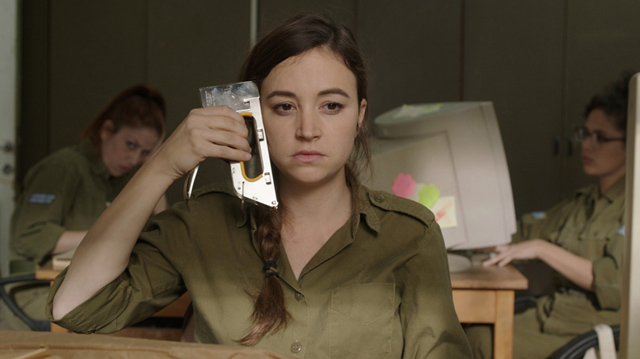If War is Hell, then Army Administrative Work is Purgatory: it could be worse, and you’ll get out eventually, but it’s still a pain in the ass while you’re there.
Zero Motivation tells the story of two slacker Israeli teenagers, Daffi and Zohar, serving out their mandatory two years in the army doing office work. When summarizing the movie, most critics tend to pitch it as a combination of M*A*S*H* and Office Space, which isn’t inaccurate for getting across the tone and humor of the film, but ultimately sells short what makes the movie unique.
Chiefly, the movie’s most unique quality is its perspective on female friendship. The cast is almost entirely female, and so has the luxury of examining several kinds of female relationships. At the center of this are Daffi and Zohar, two friends driven apart by their incompatible lack of ambition. Zohar is happy to just hang out with her friend in the middle of nowhere, trading jokes and trying to best each other’s high score in Minesweeper. Daffi, on the other hand, has big dreams about being transferred to the military base at Tel Aviv, where she can take advantage of the night life and shopping, and avoid doing real work in style. Zohar takes Daffi’s dreams of a transfer as a personal rejection, as the two have formed such a close bond. This is perhaps best showcased in the opening scene, where Zohar misses three busses to her base so the tardy Daffi doesn’t have to ride alone.
The rest of the cast that Daffi and Zohar have to deal with in the office are a lot of fun, too. There’s their boss, a an ambitious, bureaucracy-loving woman who at one point reads a tearful speech and invokes a Kafka line about paperwork being the bonds that tie humanity together without recognizing that he was being sarcastic. There’s the surly, misanthropic Russian girl who at one point becomes seemingly possessed and forgets whatever she knew about personal space. And finally there’s the two office girls who do nothing all day but sing pop songs.
The humor runs toward the absurd, culminating in a staple gun shoot out. It’s easy to see why critics use Office Space as a touchstone, but its invocation reveals a deeper, more interesting quality in the film: namely that it has an unmistakably ’90s tone and sensibility. The characters are all reasonably comfortable, and the driving force behind most of the film’s conflict is alleviating boredom. This hasn’t been a driving force in comedy since the early 2000s, further pushed to the edge of cinema by the Apatow brand of late-adolescent bildungsroman. Here there are no such pressures on the two slacker protagonists to grow up, or become productive members of society, or to leave behind childish things. Instead it’s enough to watch them take a stand against the stupidities of adult life by refusing to get out of their chairs.

